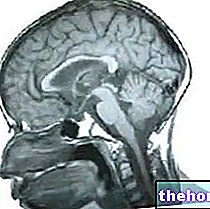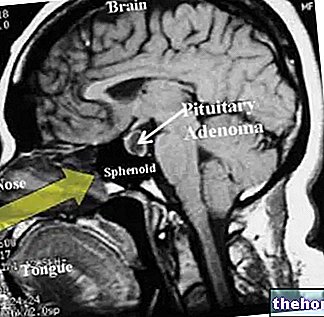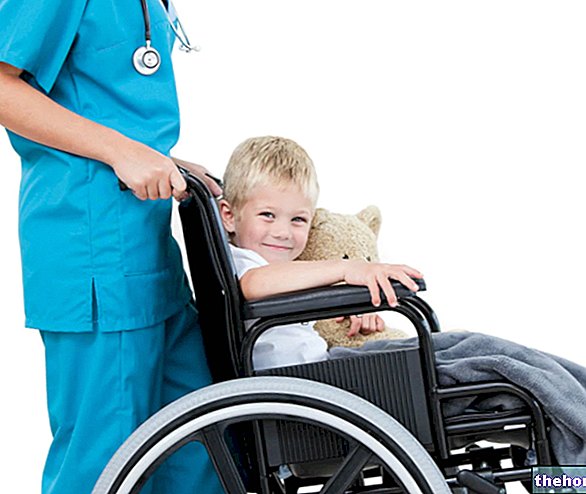
The causes of Asperger's syndrome are uncertain; according to some hypotheses, this autism spectrum disorder would have a family-genetic basis.
In addition to communication and socialization problems, Asperger's syndrome is also characterized by repetitive gestures and behaviors, and, sometimes, by clumsiness.
The diagnosis of Asperger's syndrome is by no means simple and straightforward; in fact, a specialist visit and careful monitoring of the alleged patient's behavior are needed.
Unfortunately, there are no specific treatments for Asperger's syndrome, only symptomatic treatments.
The management path of Asperger's syndrome is long and by no means easy.
Sometimes called simply Asperger's, Asperger's syndrome falls within the framework of the so-called autism spectrum disorders, a framework of conditions to which autism also belongs.
The first manifestations appear during childhood, around the age of 2-3, but it is when the patient begins school that Asperger's syndrome is generally diagnosed; in fact, it is after the first constant social interactions (with peers) that the characteristic symptoms are revealed, such as, for example, difficulties in socializing or in communicating with others.
Did you know that ...
In medicine, the word "syndrome" means a collection of symptoms and signs.
Asperger's Syndrome and Autism: the analogies
Asperger's syndrome can be considered a milder form of autism; with the latter, in fact, it shares some clinical characteristics, including:
- Difficulty of social interaction (understood as a relationship);
- Communication problems;
- Repetitive and stereotyped behaviors;
- Limited activities and interests;
- Hyperactivity and attention deficit;
- Anxiety and depression.
Epidemiology: How common is Asperger's Syndrome?
The data relating to the prevalence of Asperger's syndrome are extremely variable; this is essentially due to the use of different diagnostic criteria.
Going into the numerical details, some studies suggest that Asperger's syndrome has a prevalence of 2-3 cases per 10,000 individuals, while other researches of 2-3 cases per 1,000 people.
In order to have less different numbers, it would be appropriate to establish universal diagnostic parameters for epidemiological studies.
Asperger's syndrome appears to be more common in males; however, it should be noted that, in females, the diagnosis of this condition is more complex and this leads to its underestimation.
Did you know that ...
According to some statistical studies, in the world there are about 37 million individuals with symptoms attributable to a typical profile of Asperger's syndrome.
Origin of the name
Asperger's syndrome owes its name to the Austrian pediatrician Hans Asperger, who first described its main symptoms and manifestations around the 1940s.
Did you know that ...
Greta Thunberg, the young environmental activist, suffers from Asperger's syndrome.
. However, this is only a "hypothesis, as scientific research has yet to clarify several key details.Other theories, which deserve further study, concern the brain and some of its anatomical-functional alterations.
Finally, some past theses about possible relationships between the onset of the syndrome and childhood vaccinations have been definitively discarded.
Asperger's Syndrome and Genetics: the connections
In recent years, scientific research has identified several genes which, if mutated, would seem to have a role in the onset of Asperger's syndrome and, more generally, of autism spectrum disorders.
Some of these genes are ASPG1 and ASPG4, located on chromosome 3, ASPG2, located on chromosome 17, and ASPG3, located on chromosome 1.
In addition, the researchers noted, an important association between autism spectrum disorders (including Asperger's syndrome) and fragile X syndrome and Rett syndrome, two genetic disorders related to a sex chromosome X mutation.
Finally, in support of the theory that Asperger's syndrome has a genetic nature, various studies from which a family recurrence of the disorder emerged (eg: father and son; brothers or twins affected, both, by Asperger's syndrome or, one, from this disorder and, another, from a different autism spectrum disorder).
Asperger's Syndrome and Brain Alterations
Brain imaging studies (eg: CT scan of the brain or magnetic resonance imaging of the brain) on patients with Asperger's syndrome have shown, in a non-negligible number of cases, anomalies in some parts of the brain, in particular at the level of the frontal lobe and of the temporal lobe.
Currently, researchers are trying to understand the origin of these anomalies and their actual connection to Asperger's syndrome.
Causes of Asperger's Syndrome: Past Assumptions
In the past, some researchers had advanced the hypothesis that classic childhood vaccines were among the possible causes of the onset of Asperger's syndrome and, more generally, of autism spectrum disorders.
The investigations carried out in recent years, however, have ruled out any link between these two circumstances.
Asperger's Syndrome: the Symptoms
The characteristic symptoms of Asperger's syndrome concern and affect different areas: language, social relationships, communication, motor skills, behavior and daily interests.
The first manifestations appear at about 2-3 years of age, but these are usually noticeable only when the individual goes to school and begins to interact daily with peers and teachers.
From this point on, patients with Asperger's syndrome can appear to be self-centered, extravagant and real "little professors," which isolates them from the rest of the community.
Social interaction and communication
Those who suffer from Asperger's syndrome are unable to make use of non-verbal communication, which is made up of visual contacts with the speaker, gestures and particular postures.
Furthermore, they seem completely disinterested in forming relationships of friendship or affection with their peers; in fact, if generally children tend to share their joys, their emotions, their interests, their goals (for example, during a game) etc., those suffering from Asperger's syndrome do not demonstrate or manifest these propensities with difficulty.
Language and Communication
Asperger's syndrome greatly affects spoken language: those who suffer from it can have a monotonous tone of voice, express themselves in a pedantic way and interpret literally what they are told, without distinguishing sarcastic, ironic phrases and idioms.
It is important to underline that even this aspect does not help relationships with others, who cannot bear the presence of an individual with the aforementioned problems.
Behavior, Ritual Gestures and Daily Interests

Those who suffer from Asperger's syndrome are distinguished by gestures (for example, flapping or wringing their hands) and repetitive, stereotyped and often useless behaviors, which they cannot ignore; giving up one of these "rites", in fact, represents a real drama.
Furthermore, as with other disorders of the autism spectrum, even those who are Asperger's can develop almost manic interests, a strong attachment, for certain topics or certain objects, so much so that they devote much of their time to it.
Motor skills
Those affected by autism spectrum disorders are very often clumsy and poorly coordinated in their movements: in fact, their motor skills are not on a par with those of other peers.
Intellectual Quotient
Contrary to what one might think, individuals with Asperger's syndrome usually have a normal IQ; indeed, some of them possess outstanding mathematical, computer and musical skills.
Disorders associated with Asperger's Syndrome
Asperger's syndrome is often associated with other clinically important conditions; in particular, these include:
- Visual and hearing impairments;
- Epilepsy. About 25-30% of those with autism spectrum disorder complain of seizures. The latter usually appear during puberty;
- Psychiatric disorders. In the first place (for frequency), there are depression and anxiety crises, due to social isolation; these psychological disorders very often arise in adulthood. In second place, c "is the attention deficit hyperactivity syndrome;
- Intellectual deficits. Some patients may have a below average IQ.
- Sleep disorders. It is quite common for patients to wake up several times during the night or have serious difficulty falling asleep.
Asperger's Syndrome in Adults
The symptoms that characterize adulthood are the same as just described for childhood / adolescence. What changes is the surrounding environment, which is no longer the school one, but the work and couple relationships. Often, social isolation in adulthood translates, as already mentioned, into depressive and of anxiety.
When to see a doctor?
The most emblematic sign of Asperger's syndrome is not so much the strong attachment to that object or the desire to be at the center of attention, but rather the inability to establish a "social interaction with peers; in fact, it is customary that a child of 5 or 6 years has an obsession for a certain game, while it is much more anomalous that he is unable to establish any relationship with his classmates.
Faced with this last situation, it is good for the parent to request a medical consultation for their child.
With effective therapy, program changes are no longer a drama and strong attachment to certain objects are no longer the only daily interest.
Improve Motor Deficits
If the person affected by Asperger's syndrome presents some motor and coordination deficits, a course of physiotherapy and occupational therapy is particularly indicated.
Family Therapy and Asperger's Syndrome

With the appropriate behaviors, parents and siblings of the patient can decisively help the patient in his / her path of managing Asperger's syndrome.
This form of support is called family therapy and falls within the realm of psychotherapy.
In order to apply family therapy, it is essential that the closest relatives of the patient learn to know in detail his / her disorder and strategies to contain repetitive behaviors, to improve social interaction, etc.
Some tips for family members:
- Habit changes need to be gradual. A radical change has no effect;
- Learn about the condition;
- Getting to know the family member with Asperger's, as each patient is a separate case;
- Contact a team of experienced professionals;
- Inform teachers and co-workers;
- Making excessive preoccupation with a given topic or object become a passion. This could have a positive impact in the business context.
Drugs and Asperger's Syndrome
Through the administration of certain drugs, attempts are made to moderate depression, anxiety and attention deficit hyperactivity (when present). The pharmacological choice is wide and includes:
- Guanfacine: used when attention deficit hyperactivity disorder needs to be treated.
Side effects: drowsiness, irritability, headache, constipation, enuresis. - SSRIs (selective serotonin reuptake inhibitors): their administration is indicated to treat depression and repetitive behaviors.
Side effects: agitation. - Naltrexone: indicated in the treatment of alcoholism, is a drug that appears to moderate the excessive attachment to objects or topics and the repetitive behaviors of the patient with Asperger's (efficacy is questionable).
Side effects: possible liver damage. - Aripiprazole: it is indicated against manic-depressive states, typical of the adult patient (its use is debated).
Side effects: weight gain and increase in blood sugar levels (blood sugar). - Risperidone: is used to moderate hyperactivity (use is debated).
Side effects: sleep disturbances, runny nose ("runny nose"), increased appetite, as well as possible increases in blood cholesterol and blood sugar levels. - Olanzapine: serves to reduce repetitive behaviors and gestures (use is debated).
Side effects: increased appetite, sleepiness, weight gain, increased blood sugar and cholesterol levels in the blood.
Importance of Accurate Therapy
Educating in the rules of socialization, teaching how to manage excessive attachment to certain habits or topics, informing teachers and work colleagues about Asperger's syndrome, are the most suitable remedies to improve the quality of life of those with this spectrum disorder. autistic.
Conversely, lack of patience, lack of affection or hostile the school / work environment can worsen, even in a serious way, the living conditions.
Alternative treatments
Alongside the classic treatments listed above, there are also alternative therapies, for which there is still no "approval" (as in the case of the so-called heavy metal linking) or which have dubious effects (this is the case of melatonin and some particular dietary regimes). ).
The box below lists alternative treatments for Asperger's syndrome that are not yet approved and have uncertain effects.
- Chelation of heavy metals;
- Taking melatonin;
- Vitamin supplements;
- Diets rich in omega-3s;
- Gluten-free or casein-free diets;
- Taking secretin.




























